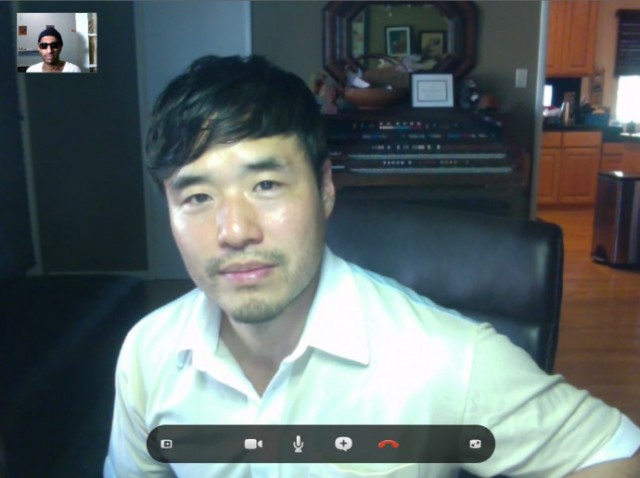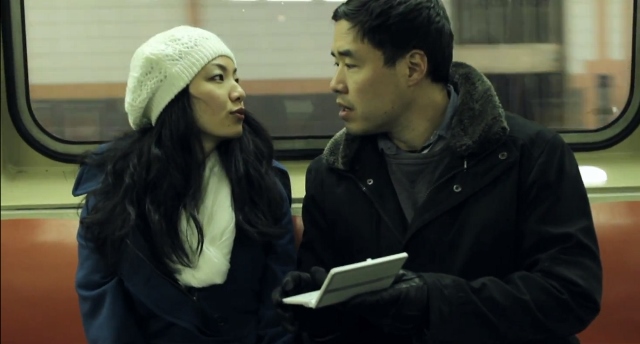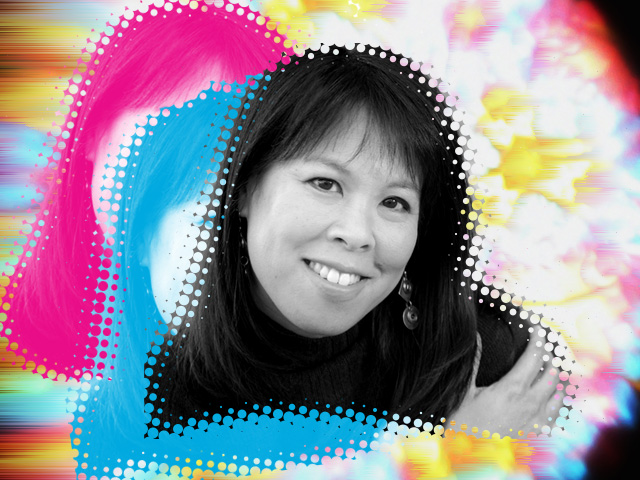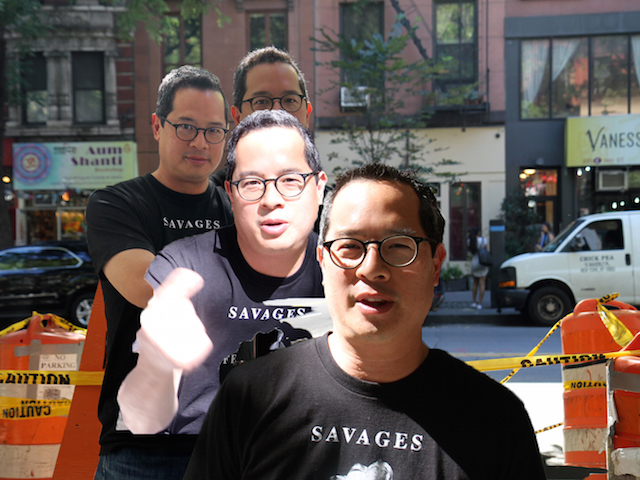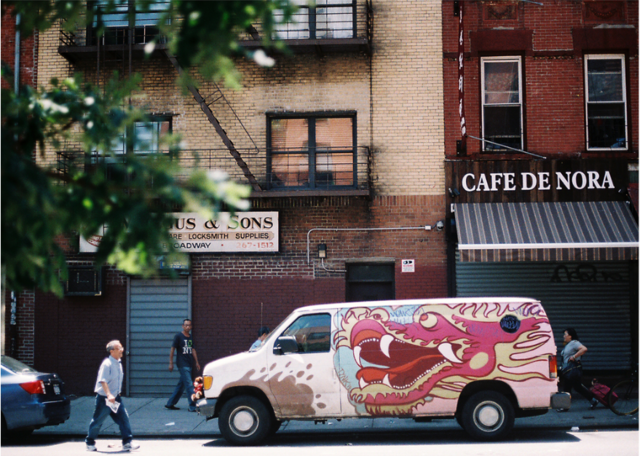Actor, writer, and father Randall Park shares an hour on the phone with Ashok Kondabolu, recalling his childhood in LA and how he stumbled into acting.
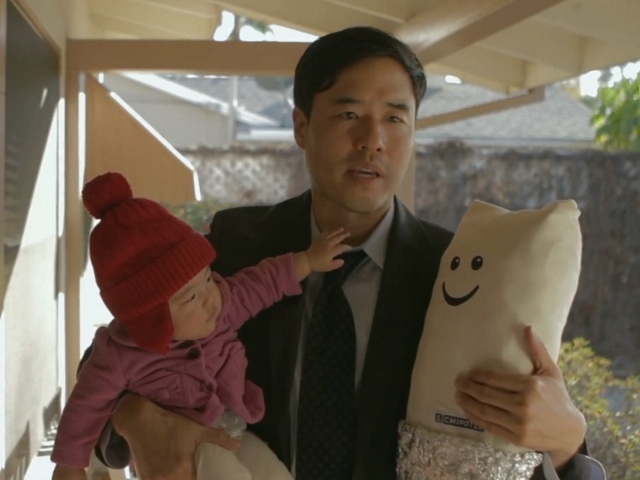
July 26, 2013
Randall Park, who currently appears as the uber-patriotic Minnesota Governor Danny Chung on the HBO television comedy series Veep, had no intention of becoming a professional actor while growing up. “It seemed like such a longshot,” he says. “The whole thing ingrained in my head was that I had to pursue something with a little more guarantee.” Despite founding an Asian American theater group while at UCLA and performing standup for years after college, Park dabbled in a bevy of unrelated jobs—from graphic designer to aspiring architect—until a Fox executive recognized his talent in a small theater production.
Ashok Kondabolu called Park on Father’s Day to talk about growing up in multicultural Los Angeles, racial politics in rap music and Hollywood, and how he maneuvers through the murky waters of performing an Asian accent with dignity.
Ashok Kondabolu: I’m sitting in my parent’s house in Queens with my brother on Father’s Day, and you live in Los Angeles, right?
Randall Park: I live in the Valley in Los Angeles. But I was born and raised in Los Angeles. I actually just moved to the Valley when we found out we were having our daughter. She’s one year old.
And your daughter was featured in the Baby Mentalist?
Yeah, yeah. (laughter) Well, my director and I made a web series and put her in it as the lead. She killed it, so we kept making more. We’re gonna make one more episode and then we’re done. She’s starting to get to that age now where she wants to do her own thing, and she’s not so happy with just hanging out with dad. So I think it’s time for her to retire.
Being Korean American, during the Riots in 1992, was that real? Was that serious stuff?
It was pretty crazy. I grew up in West LA, which I mean, it’s not Koreatown. That’s a bit farther east, between West LA and Downtown LA. Koreatown was definitely, definitely, really affected by the riots. But where I lived was still affected by them.
In fact, I remember the first day of the riots. I was in high school then. I went to a LA public school, and the makeup of the school was really diverse. The school itself was located right on the border of different communities, and a lot of the economic makeup with the school sat right in the middle of the groups.
On the first day of the riot, my friend and I decided to take a walk. And I don’t know why we decided to take a walk in the neighborhood, but we just wanted to see what was going on in our neighborhoods.
Cause you were in high school and you probably wanted to do something crazy.
We wanted to see some crazy stuff, maybe even do some crazy stuff. We still felt far away enough from it, because when you stepped out of our house on that first day, you could see plumes of smoke that blew out of the city. But they were all at a distance, so we didn’t think anything would be happening right at where we were at. LA is huge.
But as soon as we walked out, there was this local Chevron station, with the food market area that we would always go to, and kids would hang out there. I remember walking by there, and you just saw cars lined up, and people running in and out, looting, taking stuff. I remember distinctly the man at the register with his hands over his face, like there was nothing he could do. We walked further down and we saw cars being broken into. It was just chaos, you know, even where we lived.
I remember, maybe two days after the riots,going to Westwood, which is where UCLA is. There’s a movie theater there, the popular place to hang out, and it’s adjacent to Beverly Hills. And I remember seeing windows shattered everywhere. Maybe it was the college kids, I don’t know. But I remember being surprised that it went that far.
People talk a lot about that Icecube song “Koreatown” which had a lot of animosity directed towards Korean shopkeepers. Was that something that affected you? Did people say racist things to you?
That song in particular affected me deeply. I was very into Icecube, like real deep into rap music. It was something that me and all my friends were into. And because we were so into it, we were upset with the race, and we were always talking about race. We all saw things through Public Enemy, through Chuck D…
So me and all my friends, we loved Icecube. And when that Death Certificate album came out, for me and I’m sure for a lot of Korean Americans in particular, it was mind blowing. In high school, I was such a big fan that I’d buy the albums on cassette and the singles. I remember having all these Icecube albums on cassette. And I remember just like, destroying it. Like literally, stomping on it. And it sounds kind of dramatic. I don’t think anyone was around me when I did it. It just, I felt so hurt.
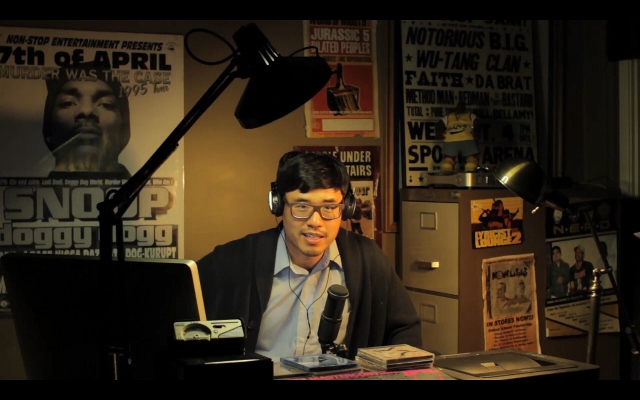
What was it like growing up in LA? Did your parents live in a Korean community, or did they know a lot of Koreans?
No, that’s another thing. I grew up in the West Side of LA, which again, was extremely diverse. My friends, we were literally this like….
A Benetton ad?
Yeah, one of every race. At the time though, Koreatown was not what it is today. Still, there was a vibrant community in Ktown, but I wasn’t really a part of that world. I would visit it often with my family, only cause that’s where the Korean market and the good restaurants were. But my childhood was primarily just this little ragtag group of friends who were all different races.
You said there was a drama thing at your high school. Did you do acting at that age? How did you get into comedy and acting and stuff?
There was a drama and arts school at my high school, but I actually wasn’t in that program. I was in the humanities program, which as opposed to doing the art, we more like studied the art. I had no intention of going into the arts at the time, I didn’t even think it was really a possibility, for me. I had the classic pressures from parents, like the doctor / lawyer route.
They wanted you to play basketball.
(laughter) They wanted me to be a point guard, really bad. So it wasn’t until college actually, going to UCLA.
In UCLA you started an acting organization, right? For Asian Americans?
Well, what happened was I had taken this creative writing class, and the teacher told me, “Aw man, you’re really good at writing, you should get into that.” So I ended up majoring in English with a focus on creative writing, mostly short stories.
But in the meantime, we had a group of friends who started dabbling with writing plays, then we started to form this Asian American theater group at UCLA. That’s how I discovered acting, though I initially came in as a writer.
The theater group is called Lapu, the Coyote that Cares. It’s kind of a long-winded name. It’s actually still going on today. I think it’s been more than fifteen years at this point since we founded it when we were at college.
What kind of productions did you do initially? Were they comedic, or drama stuff?
They were everything. The stuff I wrote always geared towards comedic, I don’t know why. When I was writing short stories for school, they would all be more dramatic and political, all the things that I was absorbing at the time. As soon as we started the theater group, they were still kind of political and dealt with community issues and stuff like that, but they were all comedic – at least the ones that I wrote.
So, you started acting relatively late, compared to other people. What were you doing in that time?
Well, I was acting in that time, for example with that theater group. But I wasn’t doing it professionally, and I had no intention of doing it professionally. Again, it didn’t seem like a possibility. It seemed like such a long shot. Also, the whole thing ingrained in my head was that I had to pursue something with a little more guarantee.
So after I graduated college, for like the next five, six years, I was doing graphic design. I ended up learning how to design things on Photoshop and Illustrator, and from that, I ended up working for newspapers creating the print design.
There was a paper out in LA called The New Times, which was basically like the LA Weekly,like the free weekly, but with the porn ads in the back. And my job was to literally to design those porn ads in the back. That was a job I had for years.
I always assumed that they all did their own little business card-sized designs and faxed it over, but I never really thought of them like that.
Some of them do, but most of them don’t. These pimps would literally come to the newspaper office with a stack of Polaroids, and you’d have to scan them. Some of the other ones were stock photos, and we’d have to reuse these photos for the ads. I don’t even know if they have these ads anymore, but if they do, you’ll notice sometimes there’s a doubling of the same photo but with a different name. But yeah, it was depressing.
So from doing graphic design, did you try to go to auditions for roles and stuff?
No, no. Throughout graphic design, I was still doing theater, even dabbling in stand-up comedy, which I ended up doing for a good six, seven years. My heart is really in this acting thing. I loved it and I loved writing little things, but I just couldn’t act on it as far as a career choice. It just began.
It’s been ingrained in me, it’s just not a possibility. It didn’t seem like an option as far as making a living. As a hobby, fine. And I think even my parents literally said that to me once, “It’s great as a hobby.”
At one point, I think I had lost my job at the newspaper, and I didn’t know what I was going to do. I decided I was going to architecture school. I had been years and years out of school at this point, and I was so sick of academia. After my undergraduate degree, I did two more years in graduate school for Asian American studies at UCLA, so I was there for a long time. But I decided to get back to community college to fulfill some prerequisites so I could go to architecture school. And I couldn’t pass the classes, I was so out of practice, you know?
Did you have an interest in architecture?
Well, I was always a good artist. But I just couldn’t pass basic physics or whatever the class was. So I ended up just bouncing around, I had like every job. And in the back of my head, I really wanted to try acting.
Around 2001, 2002, we were performing a play with the theater group. It was by Michael Galanco, who’s a fantastic writer. He started out in that theater company with us in college, ended up writing plays after graduating college. And we were doing one of his full length plays in a theater that used to be called Central City Playhouse. One day, an executive from Fox was in the audience, and after the show he pulled me aside and said, “You should really pursue this, you’re really good.”
That was kind of the validation that I had always been seeking, and that made me think, “Wow, if this guy is saying I can make a little money from this one day, then you know…”
And your parents seemed like they were generally supportive?
Before this thing happened at the playhouse, I had actually tried to talk to my parents about wanting to pursue acting, and I think I had gotten shot down. I’ve gotten into fights with them over this numerous times, before this guy came into my life at this playhouse.
So you’re like, you would secretly do it until you made a living and then all of sudden say, “Look I’m on TV,” something like that?
That’s exactly, exactly what I was thinking. So after I met that guy, he actually ended up introducing me to people at the TV network, and they set me up with a manager, and I started auditioning. And that’s what started it all. Arguably, to this day, I never really shared what was going on in my career with my parents. I don’t talk to them about it, but sometimes they’ll flip to a channel and they’ll see me. At this point, they obviously know this is what I’m doing and they’re proud of me.
Actually, now that I’m older, I totally understand where they were coming from. It’s not so much this point of contention anymore.
I think a lot of people have seen your body, because you’re in every commercial that’s ever been made in the last five hundred years. How does the commercial game work?
I don’t know, I wish I had a full understanding of it. Even though I’ve been doing them for years now, I don’t know why I’ll get booked for spots as often as I do. I have a feeling that it has something to do with when they see you in something, whether it’s in another commercial or just a TV show or movie. And they feel like because you’re a little bit recognizable, it might help.
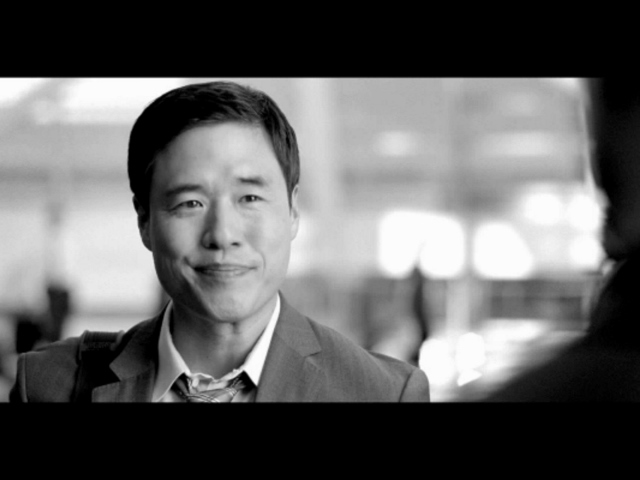
The first time I ever saw you was in the Dr. Miracles videos around 2005 I think—those were fantastic. You cast a lot of different minority actors. Was Dr. Miracles one of the first comedy sketches that you filmed and put out? What was the process?
Yeah, it was. There’s this thing in LA called Channel 101, with an offshoot in New York. It’s a monthly web series competition that was founded by Dan Harmon, who ended up creating the TV show Community.
Anyway, I made the first episode of Dr. Miracles and I sent it to both New York and LA for consideration. It ended up getting in the New York one, so we kept making more episodes and sending it off to be screened in New York. That was kind of the first webisode thing I ever did.
One of the original conceits of the show was that I wanted all the main characters to be of color. I guess it was kind of a reaction to the landscape in the media, and how it actually still is today.
And it’s also something that’s not made explicit or political in any way, it’s just a really funny gag at the end of the day.
Exactly. And I was glad people responded to it at the time. I remember I’d get emails from people in Europe and random kids dressed up as Dr. Miracle for Halloween. It was pretty awesome, knowing in the back of my head that the cast was primarily my friends who were Asian Americans, actors of colors. I was proud of that.
I know between Indian actors and musicians, because we come from Asian communities, there’s only so much visibility. The Indian and South Asian people all kind of know each other, but it’s also like, “Hey man, there’s only so many spots.” Is there a supportive Korean community of creative people?
You know, it’s interesting. As far as the acting community, I wouldn’t even say it’s a Korean American acting community, because it’s still small enough to be an all Asian American acting community, it’s extremely supportive. I don’t think I’ve ever seen any kind of cattiness or this sense of competition. There’s always a sense of competition, but everyone’s happy for each other.
Me and my brother, we have a general rule: no accents. Do you get asked to do accents, frequently, or no?
Yeah, when I first started acting. This is the thing – I’m always questioning myself and wondering if I’m losing some sense of myself. And there are definitely times where I’ve felt like I’ve sold out, and I’ve regretted certain decisions. But as far as the accent thing…
When I first started, I refused to do accents because I thought it was just fucked up. And I refused to do it, but also I just couldn’t do it. It just wasn’t in me. I’m Korean American but I don’t even speak Korean. I can understand it, but it’s not an accent I can do. Or it wasn’t at the time.
But at a certain point, particularly through doing Asian American theater, I slowly found myself starting to do a lot of accents. And I thought “This is ok, because it’s for an Asian American audience.” And so I became a little more adept at it, although I wouldn’t say I’m a master at it. When I do it, I try to do it…
With some dignity.
Yeah. Then on occasion, I would get these auditions that would call for an accent, but I would think, “Okay, is this one okay for me to go out?” I would really think about the role, and then go out for it. Usually I wouldn’t get it, because I wasn’t that good at the accent, and I was self conscious about it in the audition room. But slowly I slowly started getting okay with going out on it, depending on the role.
Right. Cause at least you have more control over it, versus someone who might not care as much about presenting the character in a way.
But you know what, I’m still at odds with it today. It’s something I think about a lot. Recently I actually went out for this TV show, a guest star spot on this African American sitcom. The role I auditioned for was kind of the “bad guy” of the episode, selling energy drink that was not very safe. They said nothing about accents in the breakdown.
I went into the audition, and it was an African American show on an African American network. I went in, did it, and then they said “Hey, can you do it with an accent?” I was kind of thrown off guard, but your gut reaction as an actor is to just go for it, all the time.
Almost instinctually, I was like “Yeah, I can.” But I didn’t really think about what I was doing or saying, or the role I was playing. I didn’t have time to think “Well, reading this with an accent, would that change things?” And so I just did it instinctually, and then I ended up getting the part.But it wasn’t that great for me, because I felt like, “Oh man, if I had actually thought about it…”
I mean, I didn’t know. It was really confusing, and then I kept thinking, “Well you know what, this is a black show, black writers, I don’t think it’s going to be that bad.”
Right. When you’re a minority in like a creative field, you have to really do the weird math of it.
Totally. And it reminded me, I was on this show called Wild ‘N Out for two seasons. It was a great experience and I loved it, but I was also the “Asian guy” on the show, where the main premise was just kind of ragging on the other team.
I was kind of at odds with it, because my whole purpose on the show was to be the guy who takes these clichéd, half-made Asian jokes, you know? But after a while, I knew I was going to get these jokes, so I crafted responses that would maybe make the Asian kid watching feeling a little more empowered.
But going back to the last job that I did, I didn’t have that option, because I had no control over the work. When you get an audition, you get basically a few pages of the script that you perform in the audition room. After I got the job, they sent me the whole script…
My character, again, was the nemesis of this episode. Had I known going into the audition that I would be doing it with an accent, I wouldn’t have gone in.
It was like a swindling Asian-type character?
Completely. I ended up doing it, but they ended up changing a lot of the lines in the show, especially the ones that I was like this is just too much. And at the end, the episode actually aired and I don’t even want to see it, and I haven’t seen it, I’m not going to see it cause it’s just like, “Gosh, I feel a little bit like I’m better than that.”
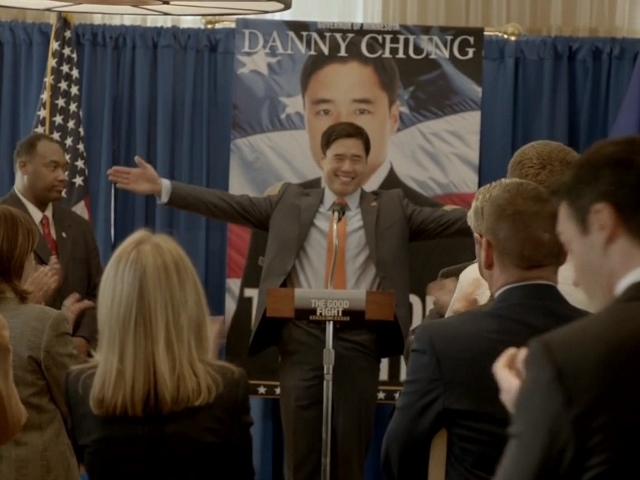
I want to get to the HBO series Veep, which is awesome. Speaking about these themes, it’s almost like the corrective to what you were saying. You’re playing this hyper-American patriot-type character, Governor Chung of Minnesota. How did you get that role on Veep?
I literally just auditioned for it. I went to a callback, and Armando Iannucci and Julia Louis-Dreyfus were there. I was super nervous because I was such a fan of both of them. Somehow I got the part, and flew out to Baltimore intermittently to shoot the episodes. The first season I was only in one, but the next season I started popping up in all the episodes. It’s been great, I have such a fun role. Great cast, and a great experience.
How is Armando Iannucci? Is he a high-strung guy?
No, he’s extremely relaxed. Gosh, he just seems like a regular guy, who also happens to be a genius. He’s really super informed. I’d never worked with a show writer who is that knowledgeable about what he was writing about. And it’s not even his home country. He’s just fantastic.
So it’s you and your wife and your daughter. And your wife is also an actress?
We actually met at an audition. Yea, she’s a great actress. We’ve worked on a few things together.
Do you plan on working together or writing a project for you to be in with your wife?
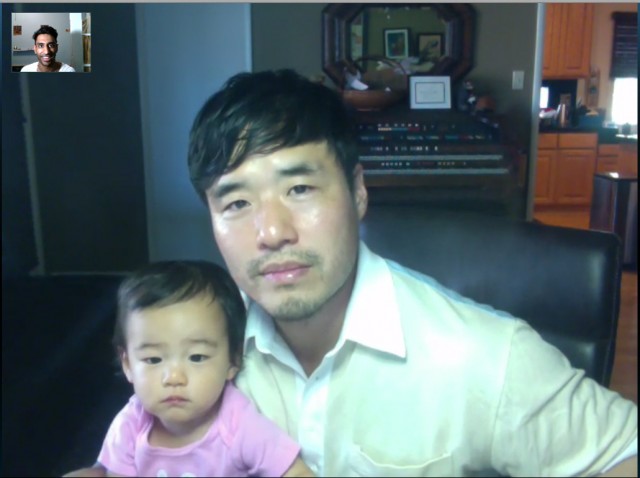 I think that’s a big reason why I made Baby Mentalist. I was going out of town a lot. And so I just wanted to dive into a project that I could do with my kid and my wife. I would definitely keep her in mind. Not just her, but all my friends. I kind of have this caravan of actors that I keep trying to work with, at least for the little, kind of modest projects that I put together, and my wife is definitely in that company.
I think that’s a big reason why I made Baby Mentalist. I was going out of town a lot. And so I just wanted to dive into a project that I could do with my kid and my wife. I would definitely keep her in mind. Not just her, but all my friends. I kind of have this caravan of actors that I keep trying to work with, at least for the little, kind of modest projects that I put together, and my wife is definitely in that company.
So I’m assuming you’re still writing projects? Like short films and sketches and stuff like that?
I’m always working on stuff. I hesitate to talk about projects because so many of them end up not happening. I end up abandoning it in the end, or putting it away and coming back to it years later, but I am always working on stuff.

